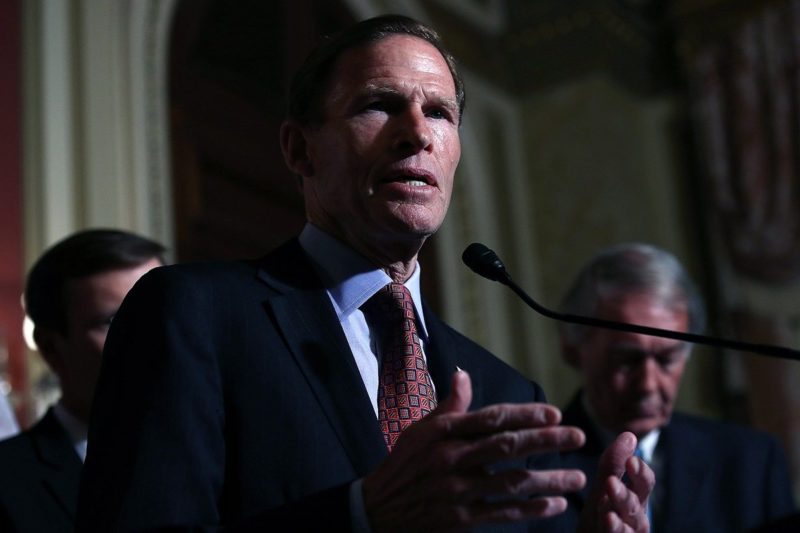Senate Democrats Attack ‘Sweeping Taxpayer-Funded Discrimination’ in Defense Authorization
The Russell Amendment would reverse nondiscrimination protections for about 28 million people in the federal contracting workforce.

Democrats in the U.S. Senate pulled no punches Tuesday against their Republican counterparts’ efforts to undo President Obama’s LGBTQ anti-discrimination measures for federal contractors.
Sen. Richard Blumenthal (D-CT) led more than 40 of his colleagues in urging the bipartisan leaders of the congressional Armed Services Committees to drop the discriminatory Russell Amendment from the U.S. House of Representatives National Defense Authorization Act (NDAA), which is under negotiation.
House Democrats shamed Republicans in May for blocking an attempt to counter the amendment, and later that month threw the floor into disarray a second time with their objections. President Obama cited the amendment in a subsequent veto threat.
Blumenthal slammed the amendment on a call with progressive allies, including NARAL Pro-Choice America President Ilyse Hogue and representatives from the Center for American Progress, the American Civil Liberties Union, the Human Rights Campaign (HRC), Planned Parenthood Federation of America, and Americans United for Separation of Church and State.
Blumenthal during the call reiterated that Senate Democrats would not stand for what he characterized as “sweeping taxpayer-funded discrimination” on the basis of sexual orientation and gender identity, as well as on the basis of religious affiliation and reproductive health-care decisions about contraception and abortion care.
The Russell Amendment would reverse nondiscrimination protections for about 28 million people in the federal contracting workforce.
“We want to send this message as powerfully and promptly as possible so that the conference committee will be aware of our concerns before the bill comes back to the Senate,” Blumenthal said.
The “Big Four” House and Senate Armed Services leaders are reportedly deadlocked over the amendment, per a memo the progressive groups shared with the press prior to the call. But Sen. John McCain (R-AZ), chair of the Senate committee, has a track record of opposition to so-called religious freedom measures.
McCain in 2014 publicly urged then-Gov. Jan Brewer, a fellow Republican, to veto a so-called religious freedom bill that would have allowed secular, for-profit businesses in the state to use religion as an excuse to legally refuse service to anyone. “I hope that we can now move on from this controversy and assure the American people that everyone is welcome to live, work and enjoy our beautiful State of Arizona,” McCain said in a statement after Brewer’s veto.
The Arizona law and the House NDAA’s Russell Amendment are “similar in intent of allowing religious discrimination,” said David Stacy, government affairs director for HRC, a prominent LGBTQ civil rights organization.
“We’re hopeful that [McCain] will take a look at this and be opposed to it, but at this point, he’s not made any public statement,” Stacy said in response to Rewire’s question on the call. “He certainly has the power to say ‘no’ to having it in the bill.”
McCain’s opposition would align him with Sen. Jack Reed (RI) and Rep. Adam Smith (WA), the Armed Services ranking Democrats, breaking any deadlock among the “Big Four.” Rep. Mac Thornberry (TX), the House’s Republican Armed Services chair, voted for the Russell Amendment in his committee back in June.
“We think that view would prevail in the conference if [McCain] took the position that this should come out,” Stacy said.
McCain’s office would not comment while negotiations are ongoing.
Should negotiations fail to remove the amendment, Senate Democrats have not decided whether to filibuster the NDAA, Blumenthal said. He’s never voted against a defense authorization bill—and he’s “very, very hopeful” that he’ll vote for this one.
“What we’re trying to do here is to eliminate this provision before the NDAA reaches the [Senate] floor,” Blumenthal said. “Clearly, there are enough signers here to indicate that there is the possibility that the bill could be blocked, at least temporarily, but we have not explicitly said we would.”

